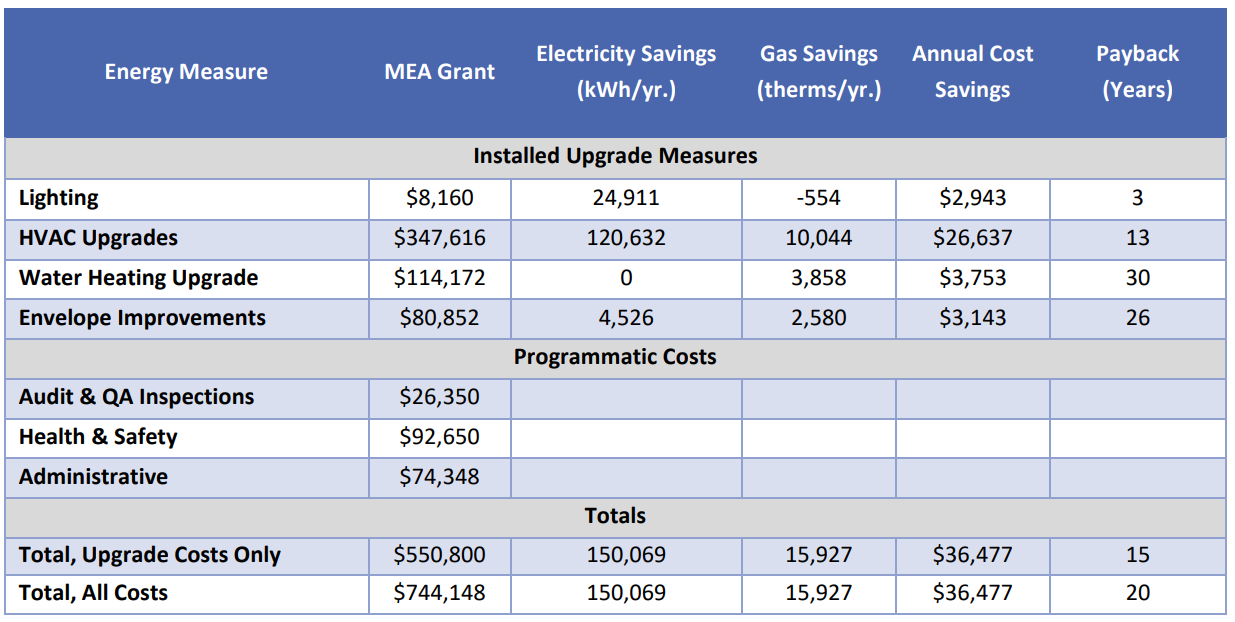Community Action Council of Howard County
The Community Action Council of Howard County (CACHC) was able retrofit low and moderate income housing to be more energy efficient with the assistance of its 2017 Clean Energy Communities Low-to-Moderate Income Grant Program (LMI) award. CACHC assists Howard County citizens by providing energy and rental assistance, operating a head start program,
and maintaining a Food Bank. For over 50 years CACHC, located in Columbia, Maryland, has provided supporting services to “diminish poverty, enable self-sufficiency and advocate for low-income families and individuals”. Using their LMI award from the Maryland Energy Administration (MEA) which allowed for energy efficiency retrofits to be performed throughout the state, CACHC was able to expand from Howard County and provide much needed upgrades on 68 homes located at Northwest Town homes in Baltimore City.
CACHC usually upgrades buildings for this type of project using other funding sources such as the Maryland Department of Housing and Community Development Empower Program and U.S. Department of Energy funding. However, the Northwest Town homes property was not eligible to access funding under these programs because the town homes did not meet specific requirements. The town homes were not eligible because 1) they are considered to be one large multifamily home instead of individual homes due to firewalls that do not extend up to the roof line for each town home, leaving the attic space open continuously from one end to the other; and 2) because the landlord did not want to limit income eligibility for all residents who live in the town homes. Furthermore, it was difficult to design cost effective retrofits for the natural gas-powered heating systems due to the relatively low cost of gas.
Community Action Council of Howard County / Northwest Townhomes Energy Savings Table
The MEA LMI Program was able to provide funding for cost-effective energy efficiency upgrades under these circumstances. The LMI Program income provisions allows for moderate income residents to participate along with low income residents, which enabled approximately 90 percent of Northwest Town home residents to qualify for upgrades. For years, owners, contractors, and other agencies attempted to service these homes with no success. With the help of the MEA LMI Program, the electric air conditioning (AC) units, natural gas heating systems, and natural gas water heaters were replaced with high efficiency units. These mechanical system retrofits were made cost efficient through purchasing in large quantities and achieving economies of scale. These
economies reduced installed costs by approximately 20 percent and resulted in a simple payback period of 15 years using conservative assumptions. This payback period estimate is higher than the initial estimate of 10 years, partly due to labor costs for envelope improvements and also due to venting modifications needed for the water heater and furnace upgrades. These venting modifications break the cycle of inefficiency by enabling future water heater and furnace upgrades to utilize high efficiency equipment. In the near term, the package of
upgrades generates energy cost savings for each household which average $536 annually, or roughly $45 per month.
In addition to lowering utility costs, the mechanical system improvements created a safer living environment for residents. The upgraded town homes no longer use natural draft gas appliances for space and water heating, and were brought up to modern ventilation standards. MEA’s LMI program funding does not have restrictions based on separation of the dwelling units and the meter
type, which enabled air sealing, lighting upgrades, and attic insulation – all of which contribute to maximizing the effectiveness of the HVAC upgrades. The landlord contributed to the upgrades by removing vegetation and pouring the concrete slabs needed for the installation of the new energy efficient AC units.
The MEA LMI Statewide award finances energy efficiency projects that benefit low-to-moderate income Marylanders through innovative ideas directed at improving buildings, neighborhoods or entire communities while achieving economies of scale through larger projects to serve more low-to-moderate income Maryland households. The LMI program seeks to leverage other funding where possible and to fill the need where other funding is not possible. These upgrades at Northwest Town homes in Baltimore City that utilized reduced rate installs would have not been possible without an MEA award and a non-profit contractor from a neighboring county willing to go the extra mile to upgrade housing that needed help but was unable to meet the requirements
of other funding sources.


 1-888-373-7888
1-888-373-7888 233733
233733